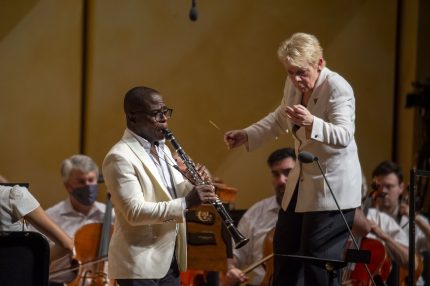Fiery Copland and witty Haydn from Alsop, McGill and CSO

The lightish mix of works on the menu for Friday night’s concert at Ravinia played to Marin Alsop’s strengths: a Haydn symphony, variations by Brahms, and an American concerto. Following the previous evening’s disappointing Mahler, this program closed out Alsop’s delayed inaugural concerts as Ravinia’s chief conductor and curator on a high note.
After his success as jazz clarinetist and big band leader Benny Goodman returned to his classical roots in the 1940s, commissioning works from Hindemith, Morton Gould and Aaron Copland. Copland’s Clarinet Concerto was completed in 1949 and premiered in a live radio broadcast the following year by Goodman with the NBC Symphony conducted by Fritz Reiner (available and well worth hunting down).
Anthony McGill was the soloist in Copland’s concerto Friday night. Born on the South Side, the Merit School alumnus has been principal clarinet of the New York Philharmonic since 2014, having spent a decade in the same position with the Metropolitan Opera Orchestra.
Copland’s concerto with its mix of Americana, Latin influences and jazz, proved the ideal vehicle for McGill’s belated CSO debut. The slow opening movement is Copland at his most affecting and McGill lofted the tender theme with rich, woody tone and spacious, heart-easing expression. The soloist’s long-breathed phrasing conveyed the open-plains folkish qualities, complemented by Alsop’s supportive accompaniment (the backing chamber orchestra is made up of just strings, harp and piano).
In the written central cadenza and final movement, McGill brought a tense, volatile quality, light years removed from Goodman’s relaxed, laid-back style in his recording with Copland. As the tempo accelerates and the Latin- and jazz-flavored complexities multiply, McGill pushed the envelope—even jumping in with an early entrance at one point—but his fiery, hair-trigger rendition was hard to resist. The soloist threw in some extra blue-note smears and it sounded like he restored the virtuosic passages that Goodman asked Copland to simplify. With Alsop and the orchestra lending comparably energized support, the final section went with a fizzing bravura rare for this piece, and McGill tossed off the final leaping riff with neat insouciance.
It was a clever bit of programming to couple Brahms Variations on a Theme by Haydn with an actual symphony by Haydn.
The Brahms Variations, which concluded the evening, received a solid, fitfully garrulous reading, well paced by Alsop and building to a suitably sonorous coda.
More rewarding was Haydn’s Symphony No. 60. Subtitled “Il distratto,” the work is an outlier in Haydn’s remarkable, 104-symphony output, a six-movement ersatz suite excerpted from Haydn’s incidental music for a popular comedic play centered on a ditsy “distracted” heroine. Yet despite its extraneous origins, the music is as engaging and delightful as any Haydn symphony written directly for the concert hall.
Haydn’s witty music is deceptively difficult to pull off but Alsop revealed herself as a sure and stylish Haydn conductor. The slow introduction set us up perfectly for the ensuing leap into a driving Allegro and the lyricism was equally well served, Alsop drawing rich playing in the Adagio di Lamentatione. The conductor showed that she got all the jokes, as with the galumphy, whirling Presto, even throwing in a brief bit of comic pantomime with associate concertmaster Stephanie Jeong in a playful “tuning-up” passage.
Pianist Mischa Dichter performs music of Beethoven and Schubert 1 p.m. Sunday at Ravinia. Ravinia.org
Posted in Uncategorized


